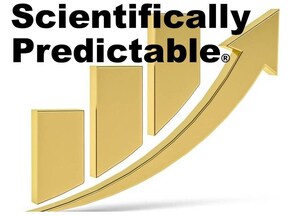SAN FRANCISCO, Aug. 22, 2019 /PRNewswire/ -- An increase in money anxiety can lower consumer confidence and cause a recession simply by reducing consumer consumption by only 5 percent according to the theory of money anxiety developed by Dr. Dan Geller, president of Analyticom. Since consumer consumption makes up about 70 percent of Gross Domestic Product (GDP), a 5 percent reduction in spending equals 3.5 percent of GDP, which is greater than the projected GDP for 2019.
As of July of 2019, the Money Anxiety Index was flat at 44.0, the same as June but slightly higher than May at 42.7 points. These figures are relatively low, and they do not point to an immediate recession. The July Money Anxiety Index reading is consistent with the preliminary retail sales increase of 0.7 percent for the same month, indicating that consumer spending is still strong because of low money anxiety. However, constant hype about a recession could increase the level of money anxiety, which in return leads to reduction in spending.
An example of how recession hype can increase peoples' perceived anxiety and reduce their confidence in the economy can be seen in the preliminary August figures of the Michigan Survey of Consumer Sentiment. The August index decreased 6.4 percent from the previous month indicating that the level of consumer confidence in the economy dropped in the first couple weeks of August. Since the Michigan index is based on what people think about the economy, in the form of a questionnaire, it is highly likely that the recent recession hype influenced the respondents' confidence about the economy.
The theory of money anxiety, which is published in the Journal of Applied Business and Economics, demonstrates how elevated level of money anxiety causes consumers to decrease their spending and shift more of their money to savings. This is an instinctive reaction to perceived or real financial danger. People are simply hoarding money in case they lose their employment as a result of the recession.
The key difference between the Money Anxiety Index and the Michigan Survey of Consumer Sentiment is that the Money Anxiety Index measures what people actually do with their money, i.e. objective representation, vs. a survey of consumer sentiment, which is subjective because it relies on what people think about the economy. Thus, the Michigan Survey of Consumer Sentiment can be influenced by a hype, and lead to premature recession caused by lower consumer confidence that leads to a decrease in consumption
The Money Anxiety Index, which measures the level of financial anxiety based on what people do with their money, is highly predictive and very reliable. Prior to the Great Recession, the index showed how peoples' money anxiety was trending upwards starting in October of 2006; nearly 14 months before the official start of the Great Recession in December of 2007. The index went as high as 100.4 in the aftermath of the Great Recession, and has declined gradually to 42.7 in May of this year. Historically, the Money Anxiety Index fluctuated from a high of 135.3 during the recession of the early 1980s, to a low of 38.7 in the mid-1960s.
About Dr. Dan Geller
Dr. Dan Geller is a behavioral economist and the developer of the theory of money anxiety and the Money Anxiety Index. Through his research firm, Analyticom, Dr. Geller provides banking executives with scientific forecasting and pricing models enabling them to improve financial performance. Dr. Geller is a frequent speaker and media guest. He appeared on national TV and radio, such as CNBC and Fox, and delivered the keynote address at the American Banker's Symposium. He is the author of the groundbreaking book on the impact of Money Anxiety on the economy.
Contact
Dr. Dan Geller
415-891-3093
[email protected]
SOURCE Analyticom

Related Links
WANT YOUR COMPANY'S NEWS FEATURED ON PRNEWSWIRE.COM?
Newsrooms &
Influencers
Digital Media
Outlets
Journalists
Opted In



Share this article